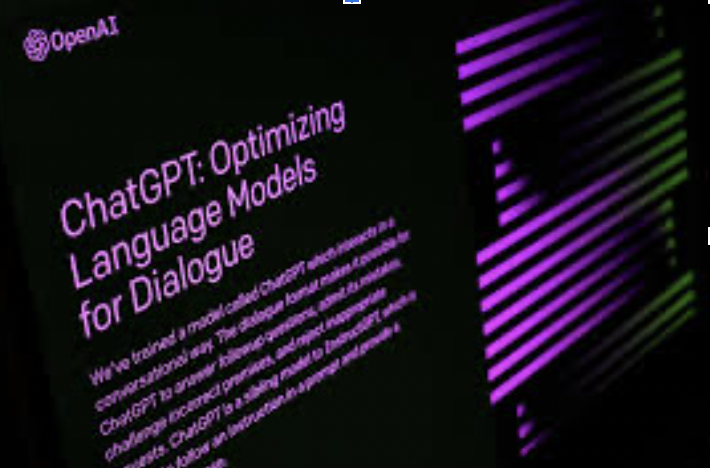Revolutionizing High School Education: How ChatGPT is Changing the Game for Students and Teachers (Title created by ChatGPT)
By: Ruairi Cooley
ChatGPT, an AI chatbot, has been taking over schools and changing educational systems around the world. This AI bot uses natural language to mimic human-like responses to various types of questions. It can also create articles, generate discussion questions, and write essays, codes, and emails. Since the release of ChatGPT the last November, talk of the new AI has been rapidly spreading around schools like Jenks. So how do students and teachers at Jenks feel about using this chatbot in the classroom? This article answers this question and gives an insight into what your teachers and students are thinking.
Shilpi Bardhan, a junior at Jenks high school, talks about how she uses ChatGPT as a tool to help her in various classes. Bardhan is one of many students that uses ChatGPT as a tool to get a better understanding of class assignments quickly. While she does use it to help her get started with some assignments, she never uses it as a way to get the final product.
“Even my teachers know that I use ChatGPT quite often,” said Bardhan. “I've told my computer science teacher about how I use it when I'm coding to quickly find bugs in the system.”
Two teachers shared how they felt about ChatGPT and AI technology in general. Micheal Horn teaches AP U.S. government, AP research, and a virtual class, and talks about how Chatgpt has affected him and his classroom. Horn has used Chatgpt for a few things in school, as well as his work as an attorney. Horn believes that it's beneficial for anybody as far as the ability to access information and process that information quickly. The main ways he has used this tool is to help create and better his own discussion questions and presentations.
“The questions that are generated aren’t necessarily fantastic like AP college board questions, but it's a great start to get the ball rolling,” said Horn.
While generating good responses is important when using this chatbot, it’s also important to make sure the people on the other side are asking well-thought-out questions.
“It works two ways. If you're asking a simple question, then you will probably get a broad answer that might not be what you're looking for,” said Horn. “However, if you are asking the chatbot a well-organized and more complicated question, it can be more helpful.”
When asked how he felt about students using Chatgpt in the classroom and his classes, Horn had great insights on why he believes it can be beneficial as long as it is not abused.
“Technology is a tool, and it’s on the person who uses that tool to be responsible with it,” said Horn. “I don't believe that advances like AI are a bad thing for education, but they will create challenges if some people are unable to adapt to the changes.”
Through some of his classes--like his virtual class--Horn has seen how many students have used ChatGPT on assignments. Since there is no way to monitor the student behind the screen, it's not possible to see if they are really learning any valuable information. However, when students choose to cheat on assignments, it becomes a different type of problem.
“Technology should not be driving learning and education, the teachers and students should be putting in the majority of the effort because technology like ChatGPT should only be used as a tool to help,” said Horn.
Students may also feel pressured to use ChatGPT because they are wanting to achieve higher grades or test scores. Sometimes students may feel like the grade in the class is more important than learning the material.
“As an education system, we should value learning because it is more important than the grade letter you see on paper. If all we are teaching is to achieve good test scores and grades, then computers can easily replace me,” said Horn.
Another similar opinion comes from Kody Engle who teaches AP world history, AP macro and microeconomics, as well as AP capstone seminar. While Mr. Engle has not used ChatGPT personally for anything school related, he has seen the positive and negative effects it can have on students and teachers.
“If AI’s like ChatGPT is being used as a starting point for a lesson or an assignment, then it has a use,” said Engle. “However, if it's being used as the product itself, then I believe it becomes more of a hindrance than a tool.”
When teachers and students use AI as an inspiration tool to get better ideas, then it can benefit the learning process. Some teachers have found that students use it in a negative way such as turning in papers that are being completely written by AI to achieve a good grade. This leads teachers to question how well these students are learning the material.
“When students view their education and learning as just a reflection of their grades, then we have a bigger issue than ChatGPT,” said Engle. “These AIs just become the vehicle that expedites the end product, it doesn’t create learning.”
While Engle has not seen much of ChatGPT being used for his class assignments, he is still aware of students who use it to generate entire assignments. Whether it's through a virtual class or in person, Engle and Horn both agree that teachers and students have to equally put in effort for growth. While AIs like ChatGPT can be useful for many purposes, it is important to value the information that is taught in schools.
“It is both the teacher’s and the student's responsibility to create a good learning environment for everyone,” said Engle. “What we teach students in schools is much more important than what AI’s can quickly generate.”
